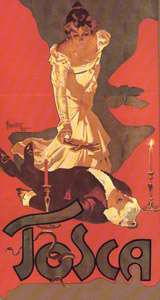Tosca

Tosca is an Opera by Giacomo Puccini, one of the most famous operas.
On the eve of Napoleon's occupation of Rome, the painter Mario Cavaradossi hides his friend, escaped political prisoner Cesare Angelotti, from the police. Unfortunately this brings both him and his sweetheart, the singer Floria Tosca, to the attention of the villainous chief of police Scarpia. Scarpia arrests Cavaradossi and demands that Tosca spend the night with him, then the painter's execution will be fake, and the lovers will be able to leave Rome. Tosca agrees, but when Scarpia comes to embrace her, she stabs him in the heart with a knife. Unfortunately, Scarpia did not intend to release Cavaradossi at all, and the execution turns out to be real. Seeing her lover dead and Scarpia's henchmen running to get her, Tosca leaps off the parapet of the Castel Sant'Angelo, crying that she will meet Scarpia before God.
Oh, and did we mention that poor Angelotti commits suicide somewhere in the middle of the second act? This gets us 4 dead people by the end of the opera.
Yeah. Opera really is angsty business, folks.
- Aristocrats Are Evil: Baron Scarpia against commoners Cavaradossi and Tosca.
- The Bad Guy Wins: Even when he's dead.
- Break the Cutie: The universe really, really has it in for poor Tosca.
- Better to Die Than Be Killed - Driven to Suicide: Tosca leaps off a parapet at the very end of the opera. Angelotti kills himself off-stage rather than go back to prison.
- BSOD Song:
- Cavaradossi's E lucevan le stelle.
- Tosca's Vissi d'arte.
- Clingy Jealous Girl: Tosca's jealousy seems to be as well-known as her singing voice.
- Cold-Blooded Torture: Cavaradossi gets this from Scarpia's goons, while Tosca is made to listen to his screams.
- Downer Ending
- The Dreaded: All of Rome trembles in fear before Scarpia.
- Due to the Dead: when Scarpia hears of Angelotti's suicide, he orders his men to hang his body from the gallows anyway.
- During the War: the outcome of the battle of Marengo is a plot point
- Evil Sounds Deep: Scarpia, the villainous chief of police, is a baritone.
- Extremely Short Timespan: the entire opera takes place in the afternoon, evening, and early morning of 17 and 18 June 1800
- Gorgeous Period Dress: for Tosca in most productions.
- Good Bad Girl: Tosca
- Hiding Behind Religion: Scarpia. Contrast with Tosca's sincere faith
- Hope Spot: Right before the "fake" execution, Tosca and Cavaradossi playfully tease each other and make plans about their happy future together.
- Irrelevant Act Opener: the shepherd in Act III.
- Kill'Em All
- Lyrical Dissonance: Scarpia has all these gorgeously melodic tunes. He's singing about his plots to rape Tosca, kill Cavaradossi, and generally be as nasty as possible. This all happens while he's in a church, with the congregation singing the "Te Deum" right behind him.
- His second Villain Song, Ha più forte sapore, in which he sings about how he likes to win women by force, is also quite lovely to hear.
- Moral Myopia: Talking loudly in church? Scandalous! Planning murder and rape while still in church? Perfectly all right.
- No Sense of Personal Space: Scarpia towards Tosca, so very often.
- Not What It Looks Like: Tosca spends most of the first act convinced that Cavaradossi is cheating on her, because he won't tell her about Angelotti.
- Ominous Latin Chanting: The "Te Deum" underscoring Scarpia's Villain Song.
- Poor Communication Kills: Cavaradossi is hiding Cesare Angelotti from the authorities. Tosca finds a fan, dropped by Angelotti's sister when hiding food and clothes, and immediately assumes Cavaradossi is cheating on her.
- Rash Equilibrium: Scarpia doesn't actually pardon Cavaradossi, as he promised Tosca; Tosca kills Scarpia rather than sleep with him as she promised in order to get the pardon.
- Scenery Porn: Sant'Andrea della Valle, the Farnese Palace and the Castel Sant'Angelo; Puccini seems determined to prove that there's no place more beautiful than Rome for a story of torture, murder, and suicide.
- See You in Hell: Kind of — just before jumping off the parapet, Tosca cries that she'll next be meeting Scarpia before God, with the implication that they'll both be answering for their crimes.
- Shot At Dawn: Cavaradossi's execution.
- Smite Me, O Mighty Smiter!: Tosca has a moment of this in act 2 after Scarpia demands that she has sex with him.
- Shout Out To Shakespeare: Scarpia compares himself to Iago in his first scene. You know, just in case you were confused about who the villain here was.
- Staged Shooting: Cavaradossi's firing squad is a subversion -- Scarpia tells Tosca that the guns will be loaded with blanks, but he pulls a variation on You Said You Would Let Them Go instead.
- Tenor Boy: Cavaradossi
- These Hands Have Killed: This trope gets a whole duet devoted to it.
- Villain Song: Scarpia gets one at the end of the first act. And another in the beginning of the second.